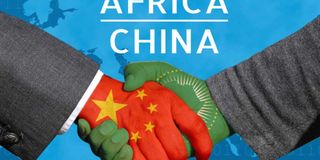Prime
African nations vulnerable to default as China trims funding

What you need to know:
Many African countries have been under economic distress due to the rapid decline in the loans pledged by China, said Timothy Ditter, a research scientist in the US-based think tank CNA’s China Studies Program.
Several nations in Africa are exposed to a high risk of economic crisis after China decided to trim the financial assistance pledged in the form of loans, especially, under the Belt Road Initiative (BRI).
While the slowdown in the Chinese economy appears the reason, the truncated funding would turn several planned and under-construction projects in these African countries unviable and push the small, vulnerable economies into debt traps.
Many African countries have been under economic distress due to the rapid decline in the loans pledged by China, said Timothy Ditter, a research scientist in the US-based think tank CNA’s China Studies Program.
“African governments are awakening to the fact that opaque PRC lending practices and problematic loan terms have rendered already fragile economies at an increased risk of default,” he said.
The slowdown in China is expected to remain sluggish and the growth rate is expected to decline further to 3.5 percent by 2028, according to the International Monetary Fund (IMF). The projected future deceleration in China’s growth would hurt the African countries, it said.
“The decline in Chinese lending, coupled with reduced support from traditional financing sources, has made it challenging for African countries to refinance public debt and meet repayment obligations,” the IMF said.
And the African countries have started feeling the heat as they face significant financial risks, said W. Gyude Moore, a non-resident fellow at the Washington-based Centre for Global Development.
“The effects are already extending to Chinese lending to Africa. China’s economic downturn brings strong headwinds for African economies in trade, investment, and lending risks,” he said.
The real estate collapse, rising unemployment and falling exports are the apparent reasons for Beijing to cut down on loans to African nations. The intention became clear at recent joint events such as the China-Africa Economic and Trade Exhibition and Forum on China-Africa Cooperation (FOCAC).
"At the FOCAC meetings, huge promises were made to support the industrial transformation of our countries. But this has not really materialized, or only in a very modest way," said African economist Carlos Lopes.
China has added green energy, high-tech investments, and artificial intelligence (AI) technologies to the BRI scheme which is traditionally focused on transport, energy, and mining. The new approach however will not translate into Chinese investment in Africa, hurting the region’s development, IMF said.
“Indeed, significant roadblocks emerge in the form of poor infrastructure, institutions, and productivity, combined with insufficiently developed human and physical capital,” it said.
China is the largest bilateral lender to several countries in the sub-Saharan region. The slowing Chinese economy and reduced funding can be challenging for these countries, said Hany Abdel-Latif and Michele Fornino, economists in the IMF's African Department.
“The ripple effects of China's slowing economy extend to sovereign lending to sub-Saharan Africa, which fell below $1 billion last year—the lowest level in nearly two decades. The cutback marks a shift away from big-ticket infrastructure financing, as several African countries struggle with escalating public debt,” they wrote.
African countries such as Chad, Ethiopia, Ghana, and Zambia have borrowed heavily from China and now seeking to renegotiate the debt repayment. However, Beijing has refused to do so since its lending interests are more driven by economic interest, which would push these countries to default, said Dr Eckhardt Bode, a researcher at Germany-based Kiel Institute.
“China’s current approach to lending and debt in African countries is likely to exacerbate a looming debt crisis. China's current unwillingness to compromise in debt negotiations could exacerbate the debt crisis and push more African countries into default,” he said.
Major projects under the BRI remain incomplete or infeasible, so loanee African countries are exposed to a high risk of default. Citing the example of Venezuela, Michael Beckley, the director of the Asia program at Philadelphia-based Foreign Policy Research Institute, said Beijing may leave these African countries to fend off the economic crisis.
“China largely cut Venezuela off from new credit and loans, leaving behind a slew of unfinished projects. Dozens of other countries that rode China’s rise are now at serious risk of financial distress and debt default as the Chinese economy stagnates,” he said.
Beckley, who authored the book ‘Danger Zone: The Coming Conflict With China’, said China is insistent on debt repayment through short-term credit swaps and loan rollovers instead of debt relief.
“It has drastically cut overseas lending and is squeezing strapped developing nations to repay their existing loans… This directly impacts countries that hitched their economic wagons to China,” he warned




